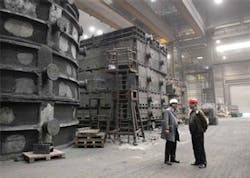Binder Chemistry is Critical to Foundrys Wind Power Strategy
Torgelow GmbH is an iron foundry in a town of that same name, in Northern Germany. While the operations there can be traced back more than 250 years, the current organization has a strategy guided by innovation, growth, and partnerships. Each of these objectives is served by Torgelow’s efforts to supply castings to the wind power market.
The economic implications of climate change and energy suppliers’ need to reduce their carbon footprints are the bases for the proliferation of wind power installations. According to the European Wind Energy Assn., 9.3 GW of wind-power capacity was installed in the EU during 2010, and wind power plants already supply 5.3% of all electricity consumed in Europe. Forecasts anticipate that wind power will account for 18% of the total generation of electricity in the EU by 2020. “Wind energy is a strong pillar which is perfectly suited to Eisengiesserei Torgelow,” stated CEO Peter Christian Weilguni. “It’s still a young industry that requires high-quality castings, and that is exactly what we offer our customers.”
Torgelow is producing complex parts like rotor blades, frames and generator housings — all technologically demanding applications. More than 50 million (est. $65 million) has been invested there to establish Europe’s largest hand molding and steel blasting shop, as well as a modern iron melting operation. Torgelow can produce castings weighing up to 150 metric tons, and thanks to its process technology and organization it can produce high volumes in series production, with quality and flexibility that match buyers’ delivery schedules.
Working with suppliers and customers in a functioning, valueadding supply chain is an important part of these accomplishments. “Such strategic partnerships are an important building block for the future development of the iron foundry,” Weilguni emphasized.
For example, working with the ASK Chemicals development team, Torgelow conceived new concepts for its coremaking and molding operations that exceed the requirements for large-scale castings. In the process, ASK Chemicals’ expertise and experience were critical in adapting applications for sulfur boundary layers and special resins that exhibit a high degree of slippage, and finishes that can withstand high thermal loads.
Torgelow sources all of its foundry additive products from ASK Chemicals’ headquarters site in Hilden, and the supplier is responsible for warehousing and logistics, too. “In such development and production processes we make our specific expertise, the entire product portfolio, and our service, available to our customers,” according to ASK Chemicals CEO Stefan Sommer. For customers like Eisengiesserei Torgelow, additives are specifically adapted to local circumstances, and information about new product solutions from the research center is supplied to customers promptly.
Uniform hardening of cast parts represents a special challenge, and for Torgelow customized additives ensure the quality of larger-dimension castings. According to ASK Chemicals, a zirconium-based primer (Trioflex WK LS1) is used to coat the mold. This coating is brushed on in its as-delivered condition to a thickness of about 0.2 mm, and dried by a gas flame. Special care is taken to avoid burning the sand, the supplier emphasized.
Then, a zirconium-graphite top coating (Trioflex WK LS 4) is brushed on, also in the as-delivered condition. Graphite in the coating gives the casting very smooth surfaces, according to ASK Chemicals. Both coatings are water-based, so the adherence is very good. Due to their thixotropic properties, only minor brush strokes may be visible in the coated surface.
In respect to sand chemistry for coremaking and molding, ASK Chemicals noted that only regenerated silica sand is used: the mean grain size is 0.34-0.38 mm; AFS number, 40-45; pH value, 3.2- 3.5; sulfur, 0.07%-0.1%. Occasionally, cores may be made of chromium sand for areas with high thermal-load exposure.
Also, a low-carbonizing binder system is used. This binder consists of a highgrade furan resin (Askuran HJT-3RS) with a furfuryl alcohol content of approximately 85% and a nitrogen content of approximately 1.5%. A low-sulfur acid (NM 3RS) is used as a hardener, with a total sulfur concentration of approximately 7.0%. Approximately 0.85% of resin and only 0.22% of hardener are added to the regenerated sand.
Optimizing control systems for sand mixing equipment is another critical aspect of casting large-dimension parts. The furan resin system and the dosing of the mixer had to be adjusted to suit the large mold dimensions, with the objective of mixing up to 80 metric tons of sand quickly and effectively. This meant equipping the furan resin system with specifically optimized ingredients and applying the correct mixing ratios. Torgelow required a mixing process that is fast, economical, and accurate, and each of these points was addressed with the help of ASK Chemicals specialists, mechanical engineering manufacturers, and Torgelow’s own technicians. Now, the foundry is operating with sand mixing systems that are precisely optimized to large-scale casting and allow extremely accurate dosing.
CEO Weilguni is impressed with the collaboration with ASK Chemicals, and satisfied with the growing trust and the long-term cooperation with the supplier. For him, adherence to agreements and highly reproducible product quality are the most important things in a partnership. “Only in this way – also in consideration of the supplier – can we achieve a customer relationship which is extremely important for our company and guarantee a binding consultation under difficult and diverse customer requests and demands,” he explained.
